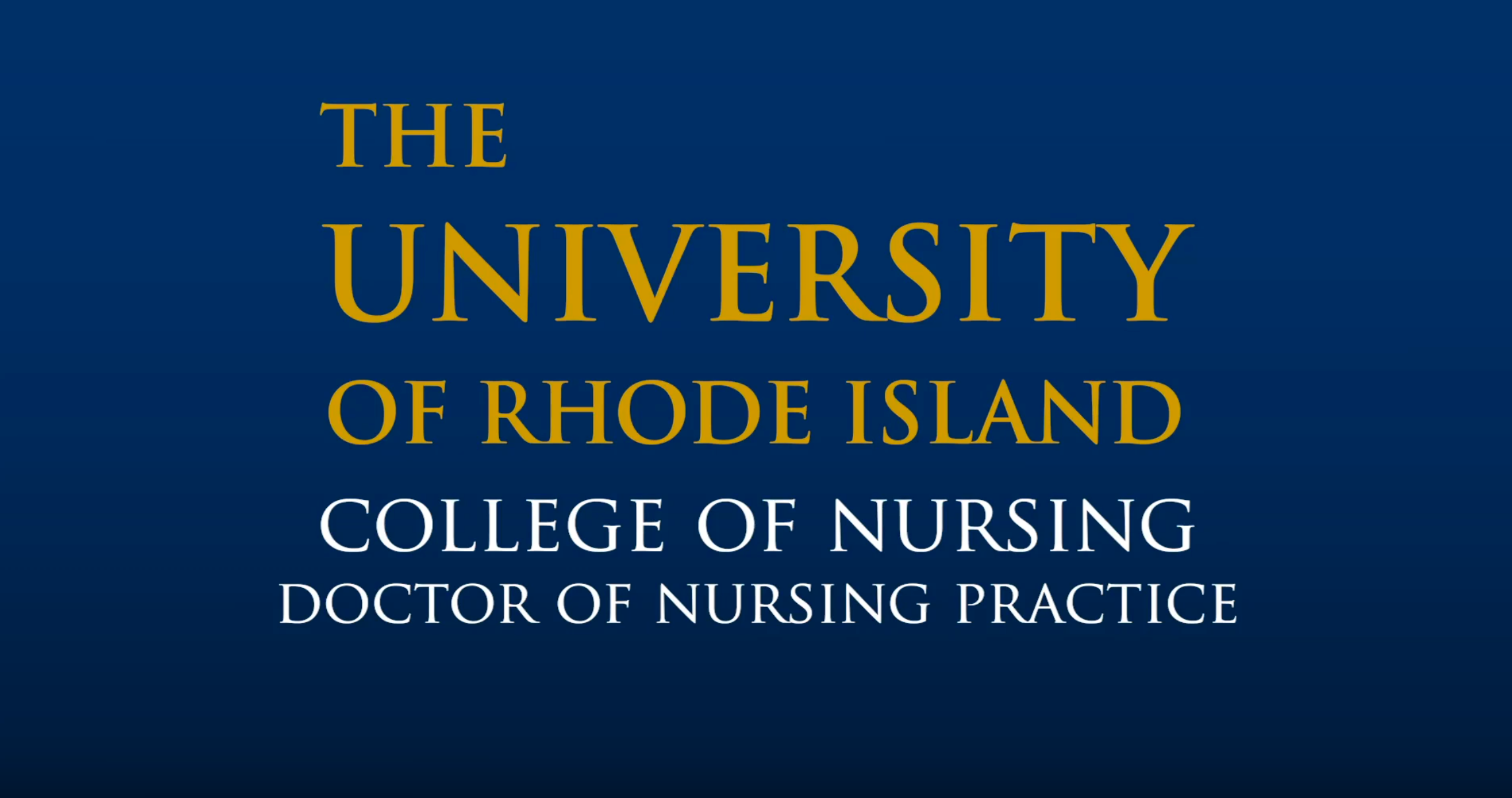Post-Graduate Doctor of Nursing Practice (Post-M.S. to D.N.P.)

Overview
The post-graduate Doctor of Nursing Practice (M.S. to DNP) program prepares nurse executives, nurses and advanced practice nurses at the highest level as leaders for the provision of outstanding and compassionate clinical practice and the design of innovative health systems. Advanced practice nurses and other M.S.-prepared nurses learn how to translate and implement scientific findings into practice, act as change agents to transform health care systems, evaluate outcomes and programs and influence health systems and policy.
All graduate nursing classes meet at the Nursing Education Center (NEC), 350 Eddy St., Providence.
The D.N.P. degree is highly recommended for nurse practitioners and other advanced practice nurses. As such, all current nurse practitioner students in one of the College of Nursing’s M.S. program specialty tracks (AGPCNP, FNP and PMHNP) who wish to continue into the D.N.P. program will be guaranteed admission, provided they are in good academic standing. (please see ADMISSION tab).
Post-M.S. to D.N.P. Program Track Outcomes
- Knowledge for Nursing Practice: Utilize theoretical perspectives to translate new knowledge and research evidence to improve advanced practice outcomes.
- Person-Centered Care: Utilize advanced evaluation skills and systems knowledge to transform health care system and promote person-centered care of individuals, families, communities, and
- Population Health: Engage in and lead local, regional, and national initiatives to promote equitable and just access to high-quality care and services for all individuals, families, communities, and populations.
- Scholarship for the Nursing Discipline: Translate research findings and facilitate the uptake of evidence-based recommendations into advanced nursing
- Quality and Safety: Integrate principles of quality improvement and safety to inform system-level policies and processes that promote a culture of safety and quality.
- Interprofessional Partnerships: Develop interprofessional collaborations and systems-level interventions to improve healthcare quality, processes, and outcomes across spheres of care.
- Systems-Based Practice: Demonstrate leadership within complex systems of care to effectively and proactively coordinate resources to provide accessible, equitable, and inclusive care to diverse populations.
- Informatics and Healthcare Technologies: Utilizes information processes and technologies to manage and improve the delivery of safe, high quality, and efficient healthcare services in accordance with best practice and professional and regulatory standards.
- Professionalism: Demonstrate leadership in asserting control, influence, and power in professional and personal context with the sphere of care and healthcare system.
- Personal, Professional, and Leadership Development: Lead sustainable system-level initiatives through promotion and mentorship of self-care behaviors and wellness strategies for self and interprofessional colleagues.
Tuition
Additional information on tuition and a full breakdown of fees can be located on the Enrollment Services Tuition and Fees webpage.
Financial Aid
College of Nursing Scholarships
The University of Rhode Island awards numerous scholarships each academic year through the fundraising efforts of the URI Foundation and the generosity of private donors. Most scholarships are chosen by the college and/or Enrollment Services.
URI Graduate Assistantships and Fellowships
Full-time graduate students may be eligible for teaching assistantships, research assistantships, and /or university scholarships and fellowships. Assistantships include tuition and a stipend in exchange for either 10 or 20 hours per week of work. Most assistantships are teaching assistantships. Research assistantships may be available through faculty research grants. Although PhD students are given priority in the awarding of teaching and research assistantships, full-time MS and DNP students are also eligible and often receive assistantships. University fellowships are competitive and awarded by the Graduate School based upon nominations to the URI Graduate School from the CON Associate Dean for Graduate Programs.

Admission
Application Requirements
The application deadline is February 15 for admission and matriculation beginning in the following Fall semester. The following are required to complete the online application to the URI Graduate School:
- Transcripts from all post-secondary institutions PLEASE NOTE: If you attended URI as an undergraduate or graduate you will still need to upload your transcripts. Unofficial copies can be uploaded into the online application. Upon admission official copies will be required prior to registration. If any courses were transferred as credit towards your baccalaureate degree, please be sure to upload those transcripts as well.
- Three letters of recommendation (academic and professional) attesting to the applicant’s ability for doctoral study, one of which must be by a doctorally prepared.
- Curriculum vita or resume
- 1-2 page goal statement which includes your reasons for pursuing advanced study in nursing and planned progression through the D.N.P. program (i.e., part-time or full-time study).
- Writing sample or scholarly paper (term paper, thesis or similar accepted). If no scholarly paper is available, then the applicant may request that the admissions committee use the goal statement as a writing sample.
- The TOEFL is required for all international applicants for whom English is not the primary language. A TOEFL score > 100 is preferred.
Admission Requirements
Admission decisions will be based on a comprehensive review of applicant qualifications presented as a total package. The following criteria will be used as the guidelines for admission decisions:
- Completed application with all materials.
- Master’s degree in nursing or its equivalent.
- A minimum G.P.A. of 3.3 is preferred.
- Eligible for R.N. Licensure in Rhode Island
- Written goal statement that documents career goals and reasons for doctoral study that are consistent with the D.N.P. degree. Goal statement should also demonstrate excellent written communication skills.
**Nurse practitioner students who are currently enrolled in the M.S. program and are in good academic standing (G.P.A. ≥ 3.3) are guaranteed admission to the post-graduate D.N.P. program track without needing to reapply. Please contact the CON graduate program office (gradnursing@uri.edu) for information on how to add the D.N.P. as a second degree program.
Curriculum
The post-graduate (post-M.S. to D.N.P.) D.N.P. program track consists of 42 credits including 500 clinical practicum hours and the completion of a practice improvement project (PIP). The post-master’s D.N.P. curriculum builds on the core elements of a master’s degree curriculum and advances the practice orientation beyond direct care and care organization to advancing practice and health outcomes through innovation and intervention at the systems level (e.g., health care systems, policy). This orientation is relevant for nurse practitioners, clinical nurse specialists, nurse leaders and executives.
Post-M.S. to D.N.P. Program Track Requirements
The post-graduate D.N.P. curriculum includes a minimum of 42 credits in three major areas: coursework, practicum, and practice improvement project.
Program pre-requisites include a master’s degree in nursing, completion of a 300- to 500-level statistics course, a master’s level introduction to research course (NUR 505 or equivalent), and a master’s level nursing theory course (NUR 507 or equivalent). D.N.P. required first level course work (9 credits) includes NUR 681, 683, and HDF 527. Remaining D.N.P. courses (20 credits) include NUR 549, 551, 680, PHP 540, MBA 540 and 5 elective credits. Elective credits may be taken in the Colleges of Nursing, Health Sciences, Pharmacy and/or Business. The program culminates with the clinical immersion practicum and practice improvement project associated with NUR 686 (6 credits) and NUR 688 (7 credits).
Licensure Disclosure
In accordance with the 2019 Reauthorization of the Higher Education Act, URI hereby discloses only that the curriculum for this program meets the educational requirements for licensure as an Advanced Practice Registered Nurse in the State of Rhode Island. The applicable licensing board in Rhode Island may impose additional requirements on candidates prior to granting a license, and we encourage you to investigate those requirements. URI has not determined whether the curriculum for this program meets the educational requirements for licensure in any other states or territories and we encourage you to investigate the requirements in your state or territory prior to accepting an offer of admission at URI.
